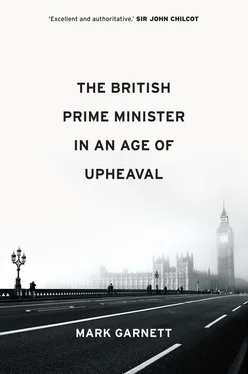1 ...6 7 8 10 11 12 ...16 In other words, it could be argued that the most significant rebellions on domestic matters during the Blair years were provoked by a government which was working on the assumption that most of its MPs would swallow almost anything which was proposed by the first Labour government in eighteen years. This marked a sharp contrast to the best-remembered parliamentary confrontations during the premiership of John Major, when Tory MPs were the aggressors, even when the government had already met them more than halfway. In fact, shortly after the government’s re-election with a reduced majority in April 1992 there had been a departure from this pattern whose significance has been obscured by the vivid memory of the Maastricht debates.
In October 1992 British Coal announced a programme to close thirty-one out of fifty deep mines, leading to the loss of 30,000 jobs. The President of the Board of Trade, Michael Heseltine, promptly unveiled a generous package of redundancy payments and retraining programmes. Although the closures were explained on grounds which the government had used during the 1984–5 miners’ strike – namely that the pits were ‘uneconomical’ – they were denounced by church leaders and Conservative MPs as well as Opposition politicians and trade unionists. Backbenchers on the government side were particularly outraged because the cuts would affect many of the workers who had refused to join the 1984–5 strike. Thus Tory MPs who were already feeling guilty because of the fall of Margaret Thatcher were now being asked to approve a measure which would threaten the livelihoods of people who had played an heroic part in the defeat of the National Union of Mineworkers (NUM). Short of targeting Falklands veterans, the government could not have found a more effective way of alienating its core supporters. The announcement was even less comprehensible because it came just a few weeks after the humiliation of ‘Black Wednesday’ (16 September 1992), when Britain was forced out of the Exchange Rate Mechanism (ERM) of the European Monetary System (EMS); indeed, the plans had been leaked to the press just two days after that traumatic episode. The government was under attack for its economic management even before that fatal blow to its reputation for competence. Faced with the certainty of defeat over the pit closures, Heseltine cobbled together a package of concessions and was able to win approval for a revised programme once the initial outcry had faded (James, 1997, 186–94).
In his memoirs, John Major claimed that although he had been consulted over the closures and had to accept ‘ultimate responsibility’, he knew by ‘instinct’ that the announcement would be ‘an absolute political disaster’ (Major, 1999, 670). This does not accord with Heseltine’s own account, which describes a meeting chaired by Major in the autumn of 1992; at that time, the general view was that the closures ‘would not prove that difficult to handle’ (Heseltine, 2000, 437). This assumption could only have been based on the experience of the Thatcher years, when the government made numerous grim announcements without suffering sizeable parliamentary rebellions. Yet although the Major Government could claim to have won a clear ‘mandate’ at the 1992 general election, its overall majority of just twenty-one seats left it vulnerable to just a handful of determined malcontents. The obvious lesson, even before the ERM fiasco, was that the government should consult carefully with potential rebels before taking any controversial decisions. Its failure to do so on this incendiary issue, in those circumstances, meant that for the first time in living memory Conservative rebels who forced a government climbdown were likely to be praised rather than pilloried in the right-wing press. The lesson that there are worse things in politics than a reputation for disunity was not lost on Labour MPs, especially since the fate of the coal mines was particularly important to them.
During the Blair years the parliamentary arithmetic was of a kind which made it difficult for the most maladroit government to bring about its own downfall. As we have seen, however, Blair and his colleagues did not fail for want of trying, starting with the deliberate provocation of the 1997 welfare reforms. After Maastricht, Major had effectively surrendered to his Eurosceptic tormentors. At times it seemed as if Blair’s main purpose was to demonstrate that there were no circumstances which could make him equally impotent. Parliament, and the Labour Party in particular, had to be reminded of who was master. As Major had shown, the Prime Minister’s ultimate weapon in any serious trial of strength was the threat of dissolving Parliament. Ideally, recalcitrant MPs would be brought back into line by the merest hint that the Prime Minister might make a particular vote into an issue of confidence in the government. Blair’s mismanagement of his majority is illustrated by his tendency to make this threat explicit. Thus, for example, at a press conference in December 2003 he staked his personal authority on the passage of legislation which would introduce ‘top-up’ fees for university students. Over Iraq he had no need to issue a similar warning – if he had lost the vote authorizing action his position would obviously have been untenable – but since then he had made a veiled reference to his ‘ultimate weapon’ when trying to stave off a rebellion over foundation hospitals (Cowley, 2005, 196–7, 162). Back in 1976, Harold Wilson had written that a Prime Minister who tried ‘to bring his colleagues to heel by the unilateral threat of a dissolution … would be certifiable’ (Wilson, 1976, 40). Whether or not that word was appropriate in Blair’s case, his tactics were certainly reminiscent of the Cold War notion of MAD – Mutually Assured Destruction – and invited backbenchers to call his bluff. Usually (as in the case of top-up fees) Blair’s confrontational approach was the prelude to a compromise, with rebels winning significant concessions and the Prime Minister staying in office. However, such episodes could only strengthen the feeling that the executive and the legislature were now embroiled in an endemic constitutional struggle, underlying and reinforcing battles over specific policies. This change in Britain’s political culture would not be helpful to any successor who lacked Blair’s elephantine majority – or, more importantly, the enduring personal prestige arising from his record as an election winner.
The experience of Gordon Brown is particularly instructive in this respect. Philip Cowley and Mark Stuart have charted more than 200 backbench rebellions of varying significance while Brown was Prime Minister, including one which took place less than an hour after he had formally taken office (Cowley and Stuart, 2014, 5). Yet Brown had given every indication that he had learned from the bruising Blair experience, and put forward several proposals to address parliamentary grievances. Whatever his intentions, Brown was soon sidetracked by the first signs of a global banking crisis. In fact, if he had seriously sought a more amicable relationship between the executive and the legislature, he had created a formidable obstacle himself, by announcing in his final budget as Chancellor (March 2007) that the lower (10p) rate of income tax would be abolished from April 2008. In the weeks before that measure was due to take effect, Labour backbenchers launched a concerted campaign to force either a policy reversal, or other concessions which would ensure that no one would be worse off as a result of the change. Faced with the possibility of a catastrophic defeat on a Finance Bill the new Chancellor, Alistair Darling, made a timely commitment to allocate extra money to disadvantaged groups (Cowley and Stuart, 2014, 13–16). The impression that this was a government characterized by genuine errors of judgement rather than a Blairite mission to make enemies is reinforced by its defeat in April 2009 on an Opposition Day motion calling for improved settlement rights for retired Gurkha soldiers. Losing the vote was damaging enough, but the government also suffered a public relations disaster, since the Opposition had been invigorated by the indefatigable campaigning of the actress Joanna Lumley, who was far more popular than any current member of the House of Commons.
Читать дальше












